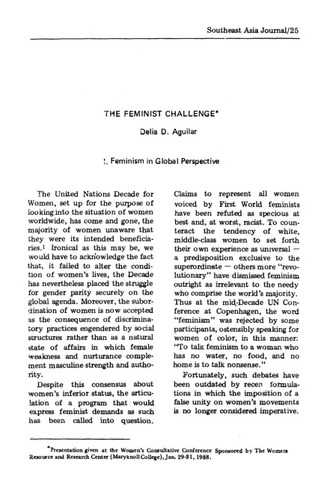Показать сокращенную информацию
The feminist challenge
| dc.contributor.author | Aguilar, Delia D. | |
| dc.date.accessioned | 2023-09-01T02:05:12Z | |
| dc.date.available | 2023-09-01T02:05:12Z | |
| dc.date.issued | 1988 | |
| dc.identifier.issn | 0038-3600 | |
| dc.identifier.uri | https://hdl.handle.net/20.500.12852/2780 | |
| dc.description | Journal article | en_US |
| dc.description.abstract | The United Nations Decade for Women, set up for the purpose of looking into the situation of women worldwide, has come and gone, the majority of women unaware that they were its intended beneficiaries. Ironical as this may be, we would have to acknowledge the fact that, it failed to alter the condition of women’s lives, the Decade has nevertheless placed the struggle for gender parity securely on the global agenda. Moreover, the subordination of women is now accepted as the consequence of discriminatory practices engendered by social structures rather than as a natural state of affairs in which female weakness and nurturance complement masculine strength and authority. | en_US |
| dc.language.iso | en | en_US |
| dc.publisher | Central Philippine University | en_US |
| dc.subject.lcsh | Feminism | en_US |
| dc.subject.lcsh | Women | en_US |
| dc.subject.lcsh | Women's rights | en_US |
| dc.subject.lcsh | Women's studies | en_US |
| dc.title | The feminist challenge | en_US |
| dc.type | Article | en_US |
| dcterms.accessRights | Publicly accessible | en_US |
| dc.citation.firstpage | 25 | en_US |
| dc.citation.lastpage | 28 | en_US |
| dc.citation.journaltitle | Southeast Asia Journal | en_US |
| dc.citation.volume | 16 | en_US |
| dc.citation.issue | 1 | en_US |
Файлы в этом документе
Данный элемент включен в следующие коллекции
-
Southeast Asia Journal [188]


